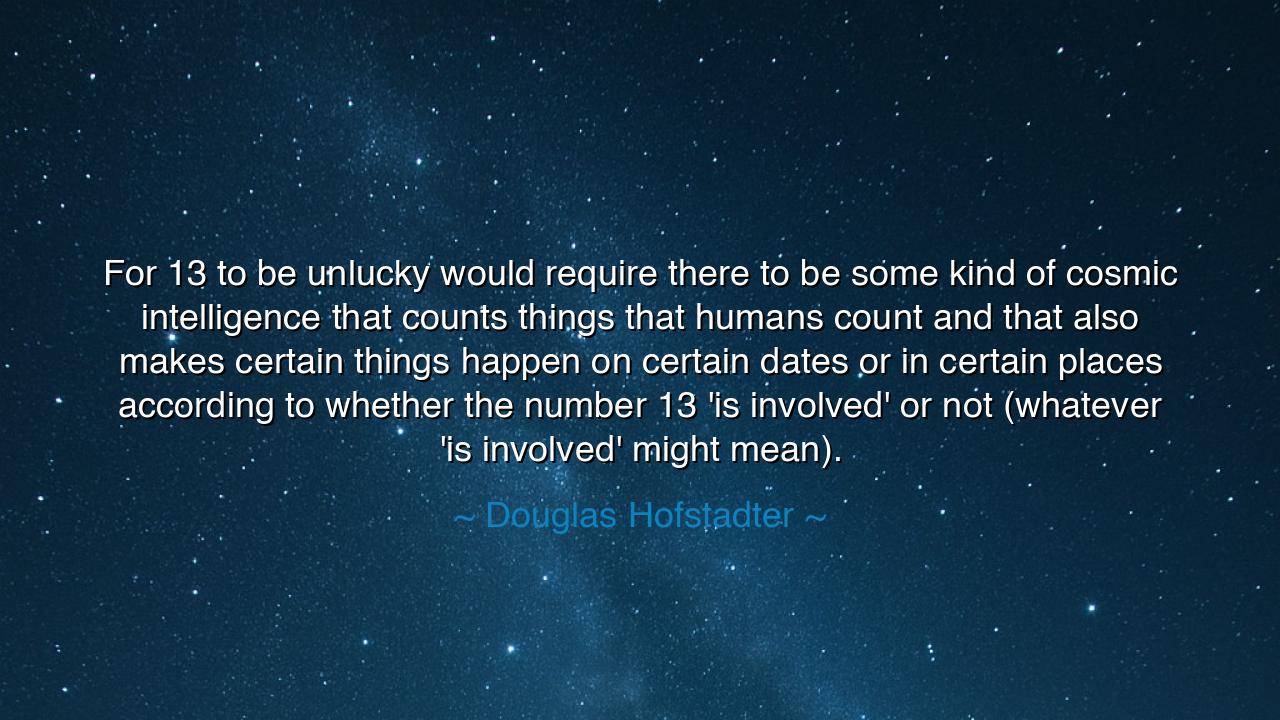
For 13 to be unlucky would require there to be some kind of
For 13 to be unlucky would require there to be some kind of cosmic intelligence that counts things that humans count and that also makes certain things happen on certain dates or in certain places according to whether the number 13 'is involved' or not (whatever 'is involved' might mean).






The words of Douglas Hofstadter, philosopher of mind and master of paradox, shine like a lantern against the fog of superstition: “For 13 to be unlucky would require there to be some kind of cosmic intelligence that counts things that humans count and that also makes certain things happen on certain dates or in certain places according to whether the number 13 'is involved' or not (whatever 'is involved' might mean).” In this reflection, Hofstadter does not merely mock a superstition—he unveils the profound gulf between human perception and the indifferent order of the cosmos. His tone is at once logical and mystical, for he speaks to the eternal tension between reason and belief, between the human need for meaning and the vast, unfeeling machinery of the universe.
Douglas Hofstadter, the author of Gödel, Escher, Bach, is a thinker who dwells in the intricate spaces between mathematics, art, and consciousness. His words here are drawn from that same labyrinth—where numbers cease to be mere tools and become symbols of how humans construct reality. The number 13, long shrouded in fear and myth, stands as a testament to humanity’s tendency to weave narrative into randomness. Hofstadter’s insight reveals that to believe a number can be “unlucky” is to project human pattern-making onto the cosmos—to assume that the universe itself counts as we do, and cares about the meanings we assign. It is, in essence, to imagine a cosmic intelligence that speaks the language of our own irrational fears.
Throughout history, the number 13 has carried an aura of dread. Ancient myths whispered of thirteen guests at the Last Supper, of Friday the 13th, and of the Norse god Loki, the thirteenth guest who brought death into the feast of the gods. From these fragments of story arose a global unease—buildings without a thirteenth floor, flights that skip row 13, hearts that tighten when the calendar aligns. Yet Hofstadter challenges this inherited fear by asking a question both simple and devastating: Why would the universe care? To believe that 13 is cursed, he says, is to imagine that the stars themselves watch our calendars, that fate counts our tables, that the laws of probability bend to the myths of men.
There is a tale, ancient and illuminating, of Galileo, who once faced persecution not because he worshiped superstition, but because he defied it. When he turned his telescope to the heavens and saw the moons of Jupiter, he shattered centuries of belief that the cosmos revolved around man. Hofstadter’s reflection stands in the same lineage. Both thinkers proclaim that truth is not shaped by our fears or traditions, but by the deeper order of reality. The cosmos does not share our concerns; it moves in patterns beyond good and evil, beyond luck and misfortune. To cling to superstition, Hofstadter reminds us, is to remain bound to the shadows of our own imagination rather than walk in the light of understanding.
And yet, his words do not mock the dreamer—they reveal the dream. For superstition arises from the same wellspring as art and faith: the yearning to find meaning in the vastness. Humanity is a creature that counts and names, that connects the thunder to the god, the number to the omen. In doing so, we humanize the infinite, giving face and form to chaos. Hofstadter, however, calls us to a higher form of wonder—a wonder rooted not in fear, but in awareness. To marvel at the mystery of existence without inventing imaginary accountants in the sky is to honor the truth more deeply than superstition ever could.
Thus, his quote is not only a defense of reason—it is a celebration of consciousness. It reminds us that meaning is born not from the cosmos, but from the mind. The cosmic intelligence we seek is, in truth, our own reflection—the human ability to perceive patterns, to question, to imagine. The number 13 holds power not because of its place in the universe, but because of its place in us. Hofstadter’s insight teaches that intelligence is the light we bring into the dark; it is what allows us to discern the difference between mystery and myth, between the eternal silence of the stars and the stories we tell beneath them.
Therefore, O listener and seeker of wisdom, take this lesson into your heart: do not fear the symbols of man’s invention. The universe does not conspire in your misfortune, nor does it reward your rituals. Instead, let your reverence be for truth itself—for the elegance of logic, the courage of inquiry, the quiet joy of understanding. When you next encounter a shadow of superstition, remember Hofstadter’s words, and smile. For the stars do not count as we count, and they do not care for our omens. But we, blessed with mind and imagination, may still gaze upward and find meaning—not in fear, but in wonder.
And in this lies the ultimate wisdom: that the cosmos, indifferent though it may be, gives us the gift of freedom. Free to think. Free to dream. Free to see that the unlucky number 13, like all symbols, is but a mirror—reflecting back to us the truth that intelligence is not found in the heavens, but within the human soul.






AAdministratorAdministrator
Welcome, honored guests. Please leave a comment, we will respond soon